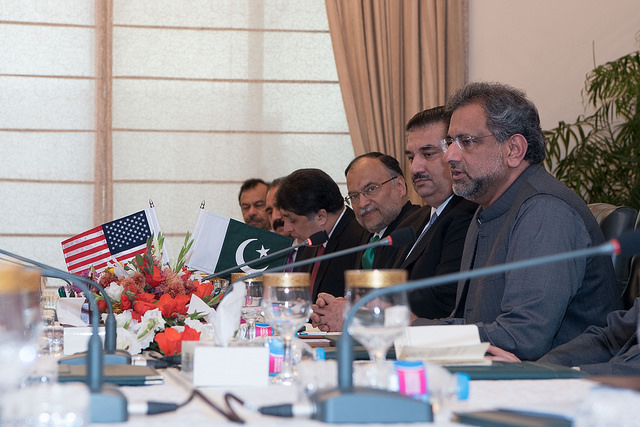Trump’s reckless tweets versus Pakistan’s democratic hopes
Posted By Shahid Javed Burki on January 9, 2018 @ 14:30

Pakistan has now joined the ranks of countries hit by one of US President Donald Trump’s characteristic tweet storms. In his first tweet [1] of 2018, Trump declared that the United States has ‘foolishly’ given Pakistan more than US$33 billion in aid over the last 15 years, while Pakistan had returned only ‘lies and deceit’ and given safe haven to the terrorists America hunts in Afghanistan. ‘No more!’ Trump concluded. And now the US is freezing its aid to the country.
Like his saber-rattling towards North Korea [2] or his unilateral decision to recognise Jerusalem as the capital of Israel [3], Trump’s attacks on Pakistan may play well with his base. But it will also have serious repercussions for Pakistan, which suffered a number of shocks in the second half of 2017 that destabilised the country politically. And if Pakistan stumbles, the consequences will be felt across South Asia and in other parts of the Muslim world, where a functioning political system in Pakistan could serve as a valuable model.
The roughly 50 Muslim-majority countries stretching from Bangladesh to Morocco have largely struggled to develop politically. Under President Recep Tayyip Erdoğan’s leadership, Turkey, which once boasted a functioning democratic system, has been slipping towards authoritarian rule. Bangladesh, too, seems to be turning into a one-party system, after having made notable headway, particularly on the economic front. Now Pakistan—in a sense, the region’s best remaining hope—is also facing potentially disruptive setbacks.
Contrary to Trump’s accusations, Pakistan has made steady, albeit slow, progress over the last decade, both in combating terrorism and in consolidating democratic institutions. That progress began in 2007, when a group of lawyers initiated a mass protest movement in response to an unconstitutional decision by Pervez Musharraf, Pakistan’s fourth military president, to suspend the chief justice of the Supreme Court. The movement, backed by several political parties, ultimately forced Musharraf to step down in 2008, to avoid impeachment.
In the subsequent general election, the Pakistan Peoples Party won enough seats in the national assembly to form a solid government. The PPP’s political rival, the Pakistan Muslim League (Nawaz) won a majority of seats in the Punjab provincial assembly, giving it control of the country’s largest province. Competitive politics had come to Pakistan.
After the PPP’s five-year term, the PML(N), led by Prime Minister Nawaz Sharif, won the next general election, while maintaining its hold over Punjab. The transfer of power occurred peacefully, with the PPP moving into opposition. Pakistan had passed another milestone.
The still-powerful generals watched these developments from the barracks to which they had retreated. After more than 60 years of changes in military leadership coming only after coups, the civilian-led government replaced the commander of the armed forces at the end of his term. This was the third momentous achievement for the rule of law and democratic development in Pakistan, which now seemed to be in a strong position to continue strengthening its political system and institutions. Its fairly well-developed political parties competed on a level playing field, elections were held when the constitution so required, and transfers of power occurred without violence.
Then, in 2016, the release of the Panama Papers exposed the extent of tax evasion by the world’s wealthy. Members of the Sharif family, it was revealed, had illegally transferred huge amounts of money into numerous offshore companies, which had then invested in expensive properties in London and the Middle East.
These disclosures opened the way for Pakistan’s own ‘Arab Spring’ moment, with young people rebelling against the elite-dominated political system. Pakistan Tehreek-e-Insaf—a political party led by the former cricketer Imran Khan—provided just the platform for that rebellion.
Featuring a platform that includes a focus on justice and good governance, PTI had been gaining ground since the 2008 election, and received a new surge of support from urban youth demanding better services and less corruption. That is no small cohort: some 75% of people in Pakistan’s large cities are below the age of 25.
Wielding its growing influence, the PTI threatened to call its young supporters into the streets if the Sharif family’s financial dealings were not properly investigated. Given Pakistan’s history of military intervention in politics—in 1958, 1969 and 1977—in response to popular protest, the PTI’s threat had to be viewed very seriously.
Pakistan avoided political escalation when the judiciary decided to investigate the Panama Papers’ revelations. In July 2017, the Supreme Court announced its verdict: Sharif had acted improperly, and could not remain a member of the national assembly, let alone prime minister. The PML(N) elected Shahid Khaqan Abbasi, a respected cabinet member, as Sharif’s successor as party leader and prime minister. Military leaders expressed satisfaction at how the situation was handled.
At the same time, given the fragility of its democratic institutions and the lingering threat of terrorism, the destabilising potential of Sharif’s removal should not be underestimated. Trump’s insistence on playing to his nationalist and xenophobic (and, specifically, anti-Muslim) base, instead of advancing the real national security interests of the US, heightens the risk.
There is, however, some reason for hope. Pakistan’s response to its recent political challenges indicates a continued commitment to fight for democracy—a commitment that could serve as a badly needed model for many other Muslim-majority countries.
Article printed from The Strategist: https://www.aspistrategist.org.au
URL to article: https://www.aspistrategist.org.au/trumps-reckless-tweets-versus-pakistans-democratic-hopes/
URLs in this post:
[1] first tweet: https://twitter.com/realDonaldTrump/status/947802588174577664
[2] saber-rattling towards North Korea: https://twitter.com/realDonaldTrump/status/948355557022420992?ref_src=twsrc%5Egoogle%7Ctwcamp%5Eserp%7Ctwgr%5Etweet
[3] recognise Jerusalem as the capital of Israel: https://twitter.com/realdonaldtrump/status/938517073508163584?lang=en
Click here to print.